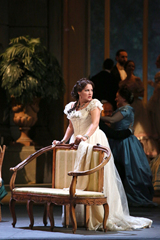| Opera Reviews | 20 April 2024 |
A thrilling eveningby Silvia Luraghi |
|
| Verdi: La Traviata Teatro alla Scala, Milan 14 March 2017 |
|
|
For the occasion, the company decided to revive Liliana Cavani’s classic production, which was shown at La Scala from 1990 to 2008: the poorly reviewed Dmitri Tcherniakov production that opened the 2013-14 season was prudently left in the warehouse. This super traditional production had been originally shown when Riccardo Muti brought back La Traviata to La Scala after over 25 years of absence: now, as at that time, it has the merit of avoiding controversy, and concentrates the attention of the audience on the singers. Cavani revived the production in person, the scenery by Dante Ferretti and the costumes by Gabriella Pescucci looked glittering as if new. The curtain rises on the gardens of Violetta’s luxurious dining hall, with singers and extras enjoying the party in colored silken clothes. The light setting of the living room in Violetta’s country house, with large windows leading to the surrounding countryside, contrasts with the more vivid colors of the party at Flora’s home, where the gypsies and the toreros dance and sing to the amusement of the guests. In the last scene, heavy curtains cover the large windows in Violetta’s home, creating a sad and gloomy setting for the heroine’s death. All expectations were obviously for the diva, and she did not disappoint her fans. Netrebko’s voice may have become somewhat heavier due to the more dramatic repertoire she has tackled in the last few years, but it still manages all the demands of the score, including the coloratura side of the first act. Also, the singer always shows her deep commitment, and does not spare her vocal resources, something that audience appreciates. She is a skilled interpreter, and remains a charming Violetta, but while she can still master the role perfectly, she should perhaps at some point consider dropping it from her repertoire: this would be a perfect moment to leave it with honors. Tenor Francesco Meli is a reliable asset for most Verdi roles, and was a very compelling Alfredo. His ringing voice masters the top, and his beautiful piani provide touching effects for this role, which is not an easy task theatrically, as Alfredo’s partner clearly dominates the scene, and much more easily captures the audience’s sympathy. This cannot be said, unfortunately of baritone Leo Nucci, who took the role of Giorgio Germont. The singer’s voice starts to sound somewhat tired, his theatrical skills are well known, but now his interpretations start to become all alike, and one must admire his performance mostly on account of his long career. The orchestra was conducted by Nello Santi, with extremely slow tempi, which certainly did not help the singers. Especially Netrebko’s aria ‘Sempre libera’ was exceedingly stretched, and the singer must be credited with the difficulty of supporting such tempi. But the same holds for Germont’s cabaletta, or for the gypsies’ chorus, and even for the final duet: this was definitely not the best side of an otherwise quite thrilling evening.
|
|
| Text ©
Silvia Luraghi Photo © Teatro alla Scala |

 Star soprano Anna Netrebko appeared at Milan’s Teatro alla Scala for three, long sold out, performances of Giuseppe Verdi’s best-selling opera La Traviata. In the last few days, scalpers were selling the already very expensive tickets for over a thousand euros, apparently finding buyers willing to pay what they asked for. And indeed the house was packed with an enthusiastic audience at all performances.
Star soprano Anna Netrebko appeared at Milan’s Teatro alla Scala for three, long sold out, performances of Giuseppe Verdi’s best-selling opera La Traviata. In the last few days, scalpers were selling the already very expensive tickets for over a thousand euros, apparently finding buyers willing to pay what they asked for. And indeed the house was packed with an enthusiastic audience at all performances. 





